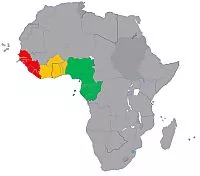One of the most compelling things about a Greek tragedy is its inevitability. Each character acts as they must. The conclusion is predictable, predicted and full of pathos. Buhari's intransigence on economic policy had all the makings of such an epic but he flirts now with a change of script. Unfortunately, the same cannot be said of the United Kingdom, which in recent days voted to exit the European Union. The implications are obscured by the subsequent policy vacuum.
Brexit, Now What?
That simple question, 'in or out', has left a great many unknown variables in its wake. Among them – the UK's official negotiating position vis a vis EU market access, the response of the EU and indeed regional governments in Scotland and Northern Ireland, as well as bilateral policy toward our countries/region. Overseas development assistance, trade arrangements between the EU and African regional economic communities, remittances and investment flows are all in the line of fire. In fact, the ink had barely dried on EU Economic Partnership Agreements (EPAs) signed by the Southern African Development Community (SADC) and the East African Community (EAC) and are still under discussion for the Economic Community of West African States (ECOWAS). The departure of the major EU member state with whom many SADC, EAC and ECOWAS nations trade presents a strong argument for renegotiation. Something the EU will be keen to avoid. Contagion may also pass through currency volatility and changes to appetite or ability for assistance. As stated in a rapid response piece written for Addleshaw Goddard, there are contingent dangers where local level Sub-Saharan African programmes and politicians may find themselves newly without funds. (See www.songhaiworldweb.com/need-to-know/-things-may-fall-apartbut-brexit-what-next-for-africa).
Political Risk at Home
The UK is not alone. Here too, home-grown constellations of political risk have also been well in view. For Ghana and Kenya alike, competition between the major political parties ahead of elections scheduled for November 2016 and August 2017 respectively has centred around the composition/conduct of their electoral commissions. An inability to remove the commissions from suspicion is a recipe for further polarisation, future electoral dispute and political violence. In Kenya, protests have already led to a number of deaths and there are no signs of the political climate being detoxified. No election date has been set in the DRC and though there has been no constitutional amendment to allow President Joseph Kabila to stay in office beyond a second term limit ending this year, recent comments, the lack of an election date and the conviction of opposition luminary Moise Katumbi in abstentia all point to an extended stay. In Nigeria by contrast, the next general elections are rescheduled for 2020 and risks are therefore of a different species. Here, the terrain is dominated by weak fiscal resources, forex constraints, slowing growth and the Buhari administration's problematic relationship with the legislature. At the nexus of political and security risk, there has been agitation in the south-south/south-east zones and middle belt of the country. All alongside an anti-corruption drive motivated by genuine zeal but marred in part by political expediency.
'No Shame... To Bend in Season'
In the play Antigone, quoted above, the king sets policy in accordance with his character and a view of the world with which one must sympathise. In the end though, unable to change course, the king's choices lead to tragedy. Nigeria's exchange rate peg of the last 16 months looked set to follow a similar arc. However, this month the Central Bank of Nigeria announced a return to automatic adjustment, thereby setting in motion improvements in access to forex. Similarly, the USD3.9 billion fine on South Africa's MTN for failing to register all sim card holders as required has now been reduced to USD1.6 billion. Former US Attorney General's non-litigious approach appears to have delivered dividends. That said on both fronts, we are not yet out of the woods. There is still a parallel market and President Buhari, who is front and centre of policy despite the CBN's nominal independence, continues to express misgivings about the current exchange rate policy. Similarly, the national assembly leans against the MTN fine at a time when the relationship between the government and the legislature is at an ill-tempered low.
Public Sector Arithmetic
History doesn't repeat itself but it rhymes. The same could be said of policy across jurisdictions as revenue mobilisation, balanced books, growth and economic diversification continue as oft-times contradictory objectives for leadership in our countries. Nigerian officials have been in China seeking financing in the tens of billions for transformation of the transport and power infrastructure. Ghana's finance minister Seth Terkper plans a 5th Eurobond for the country before the end of the year (and before the expected November 2016 election) targeting its own beleaguered power sector as well as refinancing previous debt. In Kenya, Finance Minister Henry Rotich now projects that the fiscal deficit will exceed its 9% of GDP target in 2016/17. Despite noting the tight terms Kenya should expect from foreign investors, the IMF has been relatively sanguine in its analysis of the situation, citing healthy domestic financing. No double policy makers will like Nigeria look to China, which has played an increasingly important role as a creditor over the last three years. Terkper though, could share tales about how quickly and dramatically the situation can turn around.
Growth in Quarters
Terkper could also speak to the fact that some sectors and some companies will continue to perform even in a volatile setting. This month Ghana held a digital economy event in which he noted the rapid uptake of telecommunications services across the country – 33 million subscribers in a country of over 25 million people. In fact, ICT, agriculture or off-grid power solutions are almost always the place the discussion lands in conversations about the shape of the future in our countries. Other good news from the neighbourhood – the Central Bank of West African States (BCEAO) announced low inflation figures of circa 1.9% and quarterly growth of 7.1% this month, Liberia has once again been declared Ebola free and growth in Cameroon is projected to reach a high of 6% this year alongside headline inflation of 3%.
What's the Big Deal?
Please see below for a snapshot of investment deals and developments we're seeing:
- In Nigeria, IHS acquires Helios Towers Nigeria and integrates renewable energy infrastructure into towers. Despite the acquisition, Helios Towers will continue to operate under the same name.
- Access Power has announced the award of a USD7 million prize to Mentach Energy in Nigeria, AGES Plc in Sierra Leone and Stucky Ltd in Madgascar.
- The French government is reportedly set to launch a US$60m fund providing concessional loans for private investors in renewable energy in Kenya
- The Ghanaian government continues to hint at the eventual privatisation of the Electricity Company of Ghana (ECG). Consequently, external consultants have been directed to undertake an inventory/revaluation of fixed assets.
- The firm Andela has reportedly raised USD24 million from the Zuckerberg initiative to train top developers across Africa. Thus far, the group claims to have trained close to 200 engineers out of a total 40,000 applicants.
- Ghanaian President John Mahama has celebrated the completion of 80% of phase one of Brazillian firm Construtora OAS' housing project in Greater Accra. Phase one includes 1302 of the total 5000 homes.



